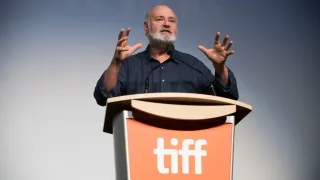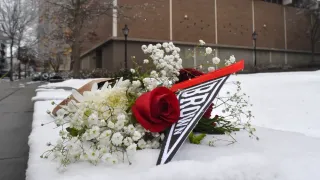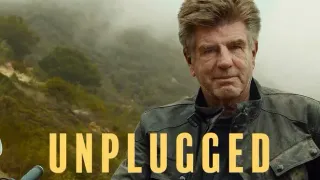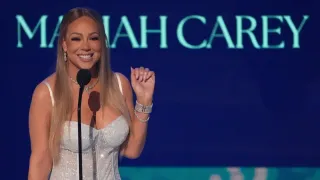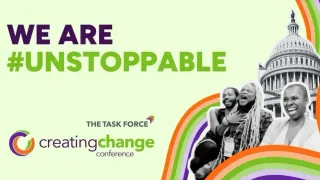September 23, 2024
Peripheral Visions: The Last Day of Summer
Kilian Melloy READ TIME: 10 MIN.
Peripheral Visions: They coalesce in the soft blur of darkest shadows and take shape in the corner of your eye. But you won't see them coming... until it's too late.
The Last Day of Summer
"Had a nice birthday?"
Farlek held out a glass of wine.
"I probably shouldn't," Pete said. "I had plenty while the party was going on."
"Fine, then I'll drink it." Farlek headed for the lawn chair next to Pete's.
"Hold on, now, I didn't say no." Pete held out his hand. "Give us that, please."
Smiling, Farlek passed the glass to him, then headed back the way he'd some. A moment later he reappeared, clutching another glass. "I just so happen," he said, "to have poured this already."
"Just so happened," Pete said, skeptically.
"Cheers."
The two men – life partners, husbands – raised their glasses to each other.
"This year was special," Farlek observed. "You got to have your birthday on the last day of summer this year instead of the first day of autumn."
"Yes, and now the dark time looms," Pete sighed. "Winter will be here soon... not that winter is what it used to be. But I still prefer summer, and long days. Still," he said, looking over at Farlek and smiling, "it seems like we're always looking back on all the fun we've had and finding time to be grateful. So..." He raised his glass again. "To you. For making every summer so much fun. And every year. And every day."
"To you," Farlek smiled. "Same."
They sipped, and Farlek sighed.
"You're not feeling sad about it, are you?" Pete asked.
"The end of summer? Your birthday? Or tomorrow's announcement?"
"Yes," Pete said. "All of the above."
Farlek shrugged. "We knew it was coming. Everyone had known it. We've been sounding the alarm for... I don't know how long. So many years that people tell us we cried wolf one too many times. But we only cried wolf once, that's what makes me angry. We cried wolf once and we never stopped. It's just... people stopped listening. Or they never listened to begin with."
"Are they sure?" Pete asked. "I mean, is this really the time? Have we reached that moment where there's no going back, no cure, no hope?"
"Too many thresholds have been crossed," Ferlak said grimly. "We're at the last tipping point. The water shortages and rolling blackouts are just the beginning. Famines, economic collapse, civil unrest, crime in the streets, war between nations, authoritarian governments... everything we've seen happening elsewhere, it's about to start happening here as well. And while civilization crumbles, the knock-on effects are going to be severe, and rapid. People are gonna start saying, 'How is this happening? How is this suddenly happening? Why are so many things going wrong?' And it won't have been sudden at all. It's just... the dominoes are falling faster, the house of cards collapsing wholesale. At some point even the most delusional people will wake up. And then," he sighed, "they'll start pointing fingers."
"I'm sure they're going to find some creative way to pin all the world's problems on us gays, just like they always do. Or, even more disgusting, on transgender children."
"Oh, we're way past that," Ferlak told him. "Try being an immigrant some time. An immigrant of color. Supposedly a 'military age male,' on top of that, though I don't know how a guy in his fifties can be thought of a 'military age,' and I'm sure I don't how naturalized citizens are now included in rhetoric about migrants." He took another drink from his glass and then held up the prescription bottle in his other hand. "You still want to?"
"You're sure that it's time?" Pete asked.
"Now, or later," Ferlak told him. "But, seriously... things are going to get ugly very quickly. They already are. Tomorrow's announcement will probably accelerate that."
"Then why release it?"
"Because we're scientists," Ferlak said. "Because, politics and religion and rhetoric aside, all this bullshit about 'divisive concepts' aside, we're still telling the truth. The numbers are solid, the data is real. The time is now. We have an agreement in our scientific community. It's unanimous. Earth's ecosystem is in terminal decline, our economic systems are about to fail, and our international order, what's left of it, is going to collapse."
"So, we're fucked, and we're doomed," Pete said. "C'est la vie."
"It's not a joke, Pete."
"No, I know."
The International Consortium of Scientific Response was poised to release its final report. The world's governments wouldn't do anything except deny its conclusions, but enough people were smart and clued in and would see it for what it was: A death knell for that way things had been... the way things had long ago stopped being, actually.
The oceans were exhausted and polluted. Wetlands had all but disappeared. The planet's atmospheric oxygen levels were plummeting. Crop failures had worsened year after year.
The end was nigh.
Pete smiled at the cliché, a cliché that was now coming true.
"I know it's not funny," he said, "but in a way it is, right? A grim fucking joke, one we played on ourselves."
"Pete, come on. There's no point to this."
"To what? 'Saying what everyone is thinking,' like our beloved leader supposedly does?"
"I want us to be calm, to be happy," Ferlak said. "That's what today was all about. That, and it was your special day."
"Yeah, special. Fifty-four... and never going to see sixty," Pete said.
"But you had fifty-four good years, didn't you?"
"No." Pete caught Ferlak's eye. "No, I had thirty good years. The ones since we met."
Ferlak smiled back at him. "We pop these pills, and we find a happy ending to our story. We get while the getting's good. As for the rest... it's not our problem anymore. Just like we discussed." He held up the prescription bottle again. "So, just say the word."
"I..." Pete hesitated. "I've been reconsidering, Ferlak."
"Oh?" His husband's tone changed. He sounded disappointed.
"No, now, just hear me out," Pete told him. "The thing is, I feel like I'm... like I'm deserting."
"Deserting what? A world that's falling apart?"
"Yes, that, but also – I'm abandoning my responsibility as a historian."
"Which is what, exactly? At the end of history – what is your responsibility then?"
"It's a terrible moment. We may be entering the last years of civilization, or even of the human race, but it's a remarkable moment. You always like to talk about the Copernican principle – that we are not located in a privileged place in the universe. But that's not true when it comes to time, at least not time on the human scale... every moment in history is privileged, because even if the stories we act out keep repeating, they do so in new ways. If this is the end of history, if it's the end of everything our species ever does, it's just the same ending to the same story all over again but this time writ larger – larger than ever before. It's my duty to see it, witness it... record it."
"Why? Record it for whom?"
"For whomever might be out there to see, hear, listen."
Ferlak frowned at Pete, then understood. "You want to make a document of this shit show and then broadcast your account to deep space?"
Pete nodded and smiled.
"What makes you think anyone is out there?" Ferlak asked. "We listened for decades. We never heard a signal. We heard lots of exotic noise, all of it the result of natural processes... but we never heard anyone else saying 'hello'."
"We were listening to a fraction of the sky," Pete pointed out. "And we were listening on radio. Why would spacefaring species use radio, when it's limited to the speed of light?"
"Because there's no better option," Ferlak said.
"We don't really know that. And here's the other thing... what if the theory that intelligent life inevitably destroys itself is true? Maybe civilizations only have the technical means to broadcast or listen for a few decades, or a couple of centuries at most. If we truly aren't in a privileged position in space or time with respect to the cosmos, then why would we expect our brief window to overlap with anybody else's? And besides, why would we assume that we're close enough to any star that harbors intelligent life for a radio signal to reach them?"
"You're not exactly bolstering your own argument," Ferlak told him.
"You're hearing me say that no one is out there right now... at least, no one close enough to hear us if we shout. But what I'm saying, Ferlak, is that us not hearing any chatter from outer space doesn't mean no one is there to say something. Or to hear something. We can broadcast in all directions if we use the global survey net. We can pump out a signal that will stay strong enough to be heard across thousands of light years... still not a very great distance, in terms the vast universe, but better than nothing. And when it comes to broadcasting, time is actually on our side. Imagine a young civilization out there right now, maybe two thousand light years from us. When our signal reaches them, will they be at our current level of technology? Will they be pointing radio telescopes at the sky? Will they be able to hear us by then?"
Ferlak sighed. "That's just another way of asking if they'll be on the brink of mass extinction, like we are."
"Maybe. But here's the thing: What if we had heard a message from the stars? What if an alien transmission had warned us about the kind of con men and self-serving psychopaths that have taken over the governments of our planet? What if someone had said, 'Here's what these people are like, here's how they operate: They tell you that taking the effort to understand the universe through facts and reason isn't worth it because you can simply believe whatever you want, and the universe will accommodate your magical thinking.' What if they had said, 'We followed leaders who had no vision, so they sold our own resentments and delusions back to us and then sat back to enjoy the power we gave them because they made us feel validated – and now their lies and our own foolishness have doomed us.' What if someone out there had taken the effort to warn us?"
"And we just happened to be listening during that short window when our ability to hear them intersected with them sending out that signal," Ferlak said dubiously.
"In all the cosmos, there must be other life," Pete argued. "In all the cosmos, some of that life must have been close enough in space and time to have been contemporaries, and neighbors, and managed to exchange a few words... perhaps a few crucial words of warning."
"We've been trying... I mean, ethical scientists, rational people, have been trying to push back against this tide of superstition and conspiracy thinking and blind bullshit for half a century," Ferlak said. "And all that's happened is strongmen have taken over everywhere on Earth and handed their pals the whole world on a platter. They have destroyed everything, including the ability of people to see what's right in front of them... much less foresee the consequences of our actions. So why would they listen to a voice from the sky when their own friends, family, and colleagues have been trying to hammer home the simple truth that facts matter, and nature can't be fooled?"
"Because it is a voice from the sky," Pete said gently. "Because people want to believe in some magical blend of best friend and Daddy... some kind-yet-cruel absolute monarch who will treat them as a favorite just because of their skin color or the prayers they say and reward them for the killing and depravity they visit on anyone who believes in a different version of the same magical sky king. To them, a voice from the sky would be a voice of authority."
"You really think so?" Ferlak asked, with a chuckle.
"Even if human beings wouldn't listen to aliens sending a warning, that doesn't mean aliens might not listen to us if we tried to warn them," Pete said.
"Really?" Ferlak asked.
"Really," Pete said.
"And even though the odds are very much against these theoretical aliens every hearing our primitive radio transmission, or even being there in the first place, you think that's a worthwhile way to spend our last few years? You think that the risk of bringing down the wrath of the government on our heads by using sophisticated equipment to send messages into the sky will be worth it? Can you imagine what our crazed, paranoid security agencies will say about it? We'll be accused of spying, we'll be tortured and murdered..."
"We'll still have our medicine if that's what it comes to," Pete said, pointing to the prescription bottle in Ferlak's hand. "Look," he added, shifting in his lawn chair, sitting straighter, his eyes alight with possibility. "History is only history if someone writes it down. A document of humanity's last pathetic chapter is still a document, even if it's written on radio waves and cast into the cosmic sea to be drowned out or lost to the depths. But it's the right thing to do. And who knows? Maybe, somehow, this was our role all along... not to be the center of the universe or God's chosen people, but to set an example to someone else, to serve as a warning that will prompt some other species of intelligence to make different choices. In any case..." Pete reached out and Ferlak took his hand. "You're right. We had our chance. But why not add some small grace note to this symphony of brutality and grief? We're headed into deprivation, terror, absolute damnation, and we brought it on ourselves. It's a sad story. But it's one that should be told."
"And you need to tell it?"
"We need to tell it, Ferlak. I can't do this on my own."
"You need my access, my connections..."
'No – I mean, yes, of course, but even more than that I need the courage and the strength I get by seeing your face, by holding your hand. I need the man I love with me to stand up in the storm and shout into the wind. Even if it's madness, even if our final words are lost, it would just be too pathetic and meaningless not to do it, but I can't do it without you."
"All that talk about facts and reason, and you're asking me to buy into your idea of a magical set of coincidences. Believe in fate," Ferlak said.
"Have faith," Pete said. "Yes. Not something a scientist can do... but a historian might. A historian who has taken note of all the strange coincidences and slim chances that piled up and made history and told the story of a species that was never going to succeed. A species that still might do one magnanimous thing, one beautiful thing, purely for the benefit of someone else."
Ferlak held up the prescription bottle. He squeezed Pete's hand. He sighed.
"All right," he said. "Why not? If everything is ending for us anyway, why not?"
Hand in hand, in silence, the two men lay under the stars and listened to the silence of the last night of summer.
Next week we turn an eye to a meeting between a songwriter of one generation and a peculiar gentleman of another. Once an arranged husband for the songwriter's grandmother, the venerable gentleman will reveal secrets long harbored and write a new verse to "A Song of the Low Red Sun."
